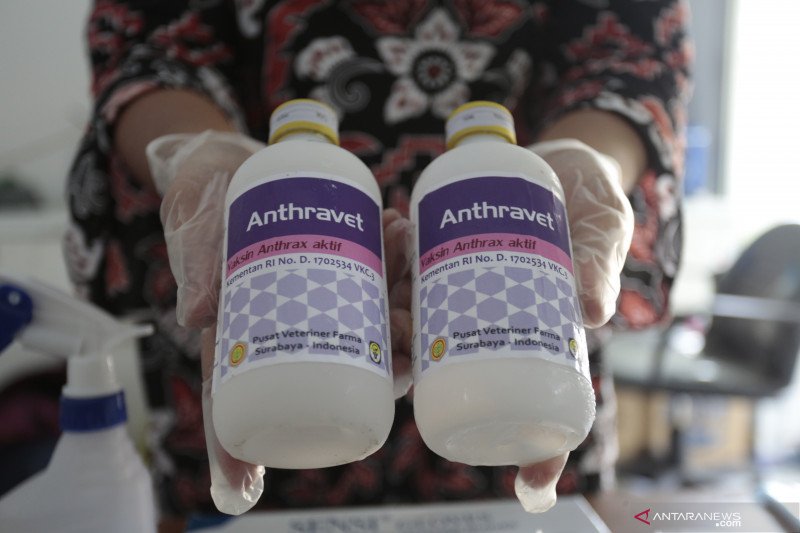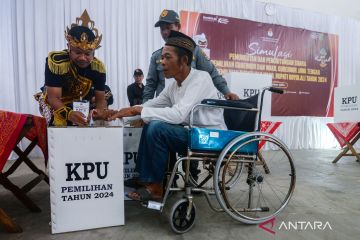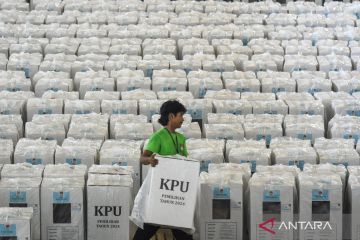
To contain the spread of anthrax, a veterinarian at the Jenderal Soedirman University (Unsoed) has called on farmers and community members to avoid direct contact with anthracis spores in contaminated soil and plants.
"Cases have surfaced of anthrax infecting the people, who came into direct contact with the anthracis spores in contaminated soil, plants, or animal products," Elly Tugiyanti, a veterinarian teaching at the Unsoed's Faculty of Veterinary Science, stated.
To this end, leading a hygienic and healthy life holds significance to help avert the spread of the disease, Tugiyanti noted here on Friday while speaking in connection with the recent anthrax cases in Gunung Kidul District, Yogyakarta Province.
Season, climate, temperature, and high-density rain are factors that play a role in the sporadic cases of anthrax, she remarked, adding that during the rainy season, for instance, grass grows well and potentially triggers direct contact with spores in the contaminated soil.
In connection with the anthrax cases in Gunung Kidul District, Yogyakarta Province, the Indonesian Health Ministry had declared an anthrax outbreak status made effective from Dec 28, 2019, to Jan 6, 2020.
The status was made effective from the day the first anthrax case was found in Ponjong Sub-district's area and then spread to Semanu Sub-district, according to Director General for Infectious Disease Control and Prevention at the Health Ministry Anung Sugihantoro.
However, the local authorities were able to manage the condition. The status of the anthrax outbreak was made affective from the day the first case was reported on Dec 28, 2019, until Jan 6, 2020, as on that day, no more cases were detected, he explained.
The Indonesian Health Ministry applies its own gradation-related procedures to handle disease outbreaks. If the number of cases increased from that recorded in the past, it could be categorized as a "breakout".
Handling anthrax cases requires focus on three areas: the health of the people, animals, and the environment since the anthracis spores are capable of withstanding any factor, he stated.
The anthracis spores might have spread to several areas but this assumption needs to be further examined comprehensively, he remarked, adding that the anthrax disease was not transmitted from human to human but from infected animals to humans.
In the meantime, the Indonesian Health Ministry dispatched a special team to examine and handle the spread of anthrax in the sub-districts of Ponjong and Semanu in Gunung Kidul District.
"My team has been deployed in the district owing to the presence of spores there. We are directly monitoring and examining that," Health Minister Terawan Agus Putranto stated earlier.
The health ministry has supplied antibiotics to treat those testing positive for the infection, he remarked, adding that anthrax might have infected several residents, who consumed the meat of a dead cow.
On January 4, 2020, health workers found that anthrax could have affected 600 residents of the two sub-districts, of which 78 were observed to demonstrate clinical features of this disease, Head of the Disease Prevention and Control Unit at the Gunung Kidul Health Office Sumitro noted.
The local health authorities sent the blood samples of the victims for testing. The result showed that 27 people had tested positive for the disease, he revealed.
The infected residents were administered antibiotic prophylaxis for 20 days and were required to undergo another blood test at Bogor City's BBVEt facilities in West Java Province, Sumitro noted.
EDITED BY INE
Related news: Gunung Kidul was declared anthrax outbreak area by Health Ministry
Related news: Gunung Kidul ever ravaged by anthrax epidemic: Indonesian official
"Cases have surfaced of anthrax infecting the people, who came into direct contact with the anthracis spores in contaminated soil, plants, or animal products," Elly Tugiyanti, a veterinarian teaching at the Unsoed's Faculty of Veterinary Science, stated.
To this end, leading a hygienic and healthy life holds significance to help avert the spread of the disease, Tugiyanti noted here on Friday while speaking in connection with the recent anthrax cases in Gunung Kidul District, Yogyakarta Province.
Season, climate, temperature, and high-density rain are factors that play a role in the sporadic cases of anthrax, she remarked, adding that during the rainy season, for instance, grass grows well and potentially triggers direct contact with spores in the contaminated soil.
In connection with the anthrax cases in Gunung Kidul District, Yogyakarta Province, the Indonesian Health Ministry had declared an anthrax outbreak status made effective from Dec 28, 2019, to Jan 6, 2020.
The status was made effective from the day the first anthrax case was found in Ponjong Sub-district's area and then spread to Semanu Sub-district, according to Director General for Infectious Disease Control and Prevention at the Health Ministry Anung Sugihantoro.
However, the local authorities were able to manage the condition. The status of the anthrax outbreak was made affective from the day the first case was reported on Dec 28, 2019, until Jan 6, 2020, as on that day, no more cases were detected, he explained.
The Indonesian Health Ministry applies its own gradation-related procedures to handle disease outbreaks. If the number of cases increased from that recorded in the past, it could be categorized as a "breakout".
Handling anthrax cases requires focus on three areas: the health of the people, animals, and the environment since the anthracis spores are capable of withstanding any factor, he stated.
The anthracis spores might have spread to several areas but this assumption needs to be further examined comprehensively, he remarked, adding that the anthrax disease was not transmitted from human to human but from infected animals to humans.
In the meantime, the Indonesian Health Ministry dispatched a special team to examine and handle the spread of anthrax in the sub-districts of Ponjong and Semanu in Gunung Kidul District.
"My team has been deployed in the district owing to the presence of spores there. We are directly monitoring and examining that," Health Minister Terawan Agus Putranto stated earlier.
The health ministry has supplied antibiotics to treat those testing positive for the infection, he remarked, adding that anthrax might have infected several residents, who consumed the meat of a dead cow.
On January 4, 2020, health workers found that anthrax could have affected 600 residents of the two sub-districts, of which 78 were observed to demonstrate clinical features of this disease, Head of the Disease Prevention and Control Unit at the Gunung Kidul Health Office Sumitro noted.
The local health authorities sent the blood samples of the victims for testing. The result showed that 27 people had tested positive for the disease, he revealed.
The infected residents were administered antibiotic prophylaxis for 20 days and were required to undergo another blood test at Bogor City's BBVEt facilities in West Java Province, Sumitro noted.
EDITED BY INE
Related news: Gunung Kidul was declared anthrax outbreak area by Health Ministry
Related news: Gunung Kidul ever ravaged by anthrax epidemic: Indonesian official
Reporter: R013
Editor: Atman Ahdiat
Copyright © ANTARA 2020
Editor: Atman Ahdiat
Copyright © ANTARA 2020













